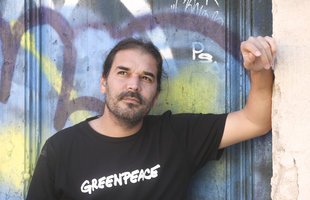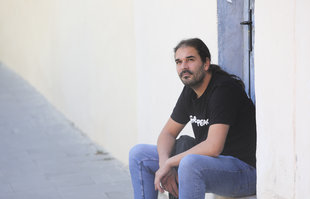Before joining Greenpeace, you worked with Catalan NGOs fighting to expose the actions of certain companies operating abroad.
Before I started working with Greenpeace, my work was very much related to the imbalance of power in the international sphere, between the power of big business and the defence of environmental human rights. There is a gap. If you have a case of human rights violation, there’s no legislation, no judge who can address it. There are no strong laws to hold companies accountable. In Catalonia a process is underway to tackle this issue and a working group has been set up. It’s necessary to show the impact of Catalan companies abroad. At Greenpeace we’re working on a so-called due diligence law, or rules aimed at getting companies to report what they are doing so they aren’t able to get away with it.
What’s Greenpeace doing to help?
As a pressure group we’re lobbying in the Spanish parliament for progress to be made on this law, so that Spanish and Catalan firms will be held accountable for their business activities abroad. It’s also about monitoring everything in the supply chain.
Right now firms can do what they like abroad if the country they operate in doesn’t specifically prohibit it.
Often the situation is that these companies choose countries where there is corruption as well as great economic needs. They take this into account but not the rights of indigenous peoples, for example.
The expansion of Greenpeace around Spain began only three years ago.
Yes, it’s very recent, and we’re taking our time. It’s not so much an exercise of decentralisation as a way of increasing our presence. We’re now in Catalonia, the Basque Country, Galicia and Andalusia, because of the political, economic and historical importance of these areas.
There are now environmental groups of all kinds. How important is it for Greenpeace to work with other NGOs?
The climate emergency and the biodiversity crisis are such big issues that Greenpeace alone would get nowhere. We need to stand and work together, despite the differences that may arise from time to time. Otherwise, we won’t achieve the goals that have been set. There’s work to be done in changing mindsets and raising public awareness, but at the same time we need to work on structural changes and changes to public policies.
How does the idea of expanding Greenpeace around Spain translate into action? Is it about bringing global concerns here, or supporting local issues?
A bit of everything. The idea is to bring global, international and state campaigns here, but if there’s a local conflict that fits into the work of Greenpeace, we want to be part of it. An example is last year when we got involved with stopping the expansion of Barcelona-El Prat airport. We supported the ZeroPort platform, which led to protests. And not only that, but we also took direct action at El Prat airport, taking a 12-metre train there to call for more trains and fewer planes while opposing the airport’s expansion.
Many remember Greenpeace’s impact when they were the only ones protesting. Now Greenpeace is surrounded by other groups. Is there unity among you?
At the state level, there’s a coordinator of organisations, Climate Rebellion, which has been working since 2020 to bring together environmental groups on a statewide level. We also have a more institutional space of great importance, the G5, which brings together the five largest environmental NGOs in Spain. And in Catalonia, during the pandemic the Network for Climate Justice was created, which is a platform that groups together a score of organisations, representing a lot of people, who try to work together and do joint campaigns. It was created in Barcelona with the aim of expanding it throughout Catalonia. Working in a network has already begun and we’re focused on continuing that.
What are Greenpeace’s priorities?
They can be split into two main blocs. On the one hand the climate emergency, and on the other the loss of biodiversity. In the case of the climate, we now have a very powerful campaign about fossil fuels. The campaign includes, for example, collecting signatures calling for a ban on the advertising of fossil fuels in the EU. At the same time, we’re calling for a plan to abandon the use of fossil fuels and change to renewables. We also have a programme about renewables that looks at the empowerment and democratisation of renewable energy. We need to strengthen the abilities of communities to become more self-sufficient in terms of energy, and that means democratising energy and breaking with the energy oligopoly that exists in this country. There’s a lot of work to be done, which also includes land use planning. The Ministry of Ecological Transition and Demographic Challenge has made a map that is not binding but that at least provides a context for responsible land use, although much more still needs to be done in this area. We also have a campaign related to the climate and greenhouse gases that focuses on returning to the widespread use of rail to reduce the need for short haul flights, such as the Madrid-Barcelona air shuttle. This year we also want to focus on low-emission zones. By 2023, low-emission zones should be installed in every city in Spain that has more than 50,000 inhabitants. Later the goal will be cities of 20,000 inhabitants. We want to push all of this and see it implemented with the criteria for it clearly set out.
And the other bloc you said was the fight for biodiversity?
In 2021 we started with the Parla rural (Talk rural) campaign to focus attention on the underpopulated areas of Spain and the importance of rural ecosystems in terms of the biodiversity of the whole state. We found that where there’s more biodiversity, there’s more resilience, and the study clearly showed that that there’s more biodiversity in rural areas than in cities. In the same vein, in 2022 we are continuing the work by focusing on macro-farms. We want moratoriums on the creation of new macro-farms, moratoriums for the whole state, or at least for some autonomous communities. We can link many issues to this topic, such as depopulation, as macro-farms do not increase the number of people living in rural areas. They also contribute to aquifer pollution and deforestation. We want a moratorium to reduce the number of livestock and to begin moving towards extensive, sustainable and environmentally friendly livestock farming.
Talking about aquifers, drought is a recurring anxiety.
Some 75% of territory in Spain is threatened by desertification. Clearly there’s a lot of work to be done, both in terms of illegal wells and water theft. It’s also clear that there needs to be more dryland agriculture to prevent the need for irrigating land, with all the problems that come from transferring water and the infrastructure it needs. And talking about infrastructure, we should pay attention to places like golf courses. These issues only aggravate the problem of climate change. We’re the EU state most at threat from desertification. We already know what comes with climate change: higher temperatures, more evapotranspiration [plants lose water through evaporation on the one hand and transpiration on the other], less rain, and when it does rain it does so torrentially and sporadically, which does not replenish the aquifers. And as well as all of that are the issues related to gas and nuclear energy.
And it’s the most vulnerable who pay the biggest price?
Yes, and this happens all over the world. Those most affected will be in coastal areas. And related to that, when we talk about making necessary changes we’re very aware that in the end that means losing jobs. That means that you can’t close down an industry overnight, you have to have a plan, so that workers can be trained for other jobs. It’s not about closing the macro-farms all at once, let’s say. A plan must be established to help us move gradually from one model to another. What’s wrong, though, is doing nothing.
interview environment
interview environment




